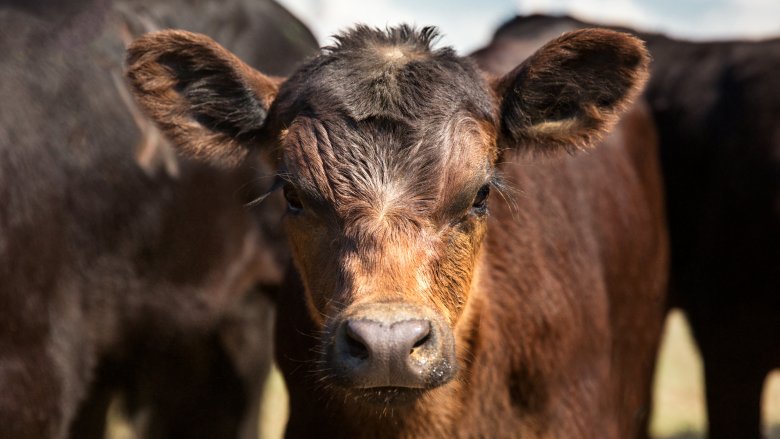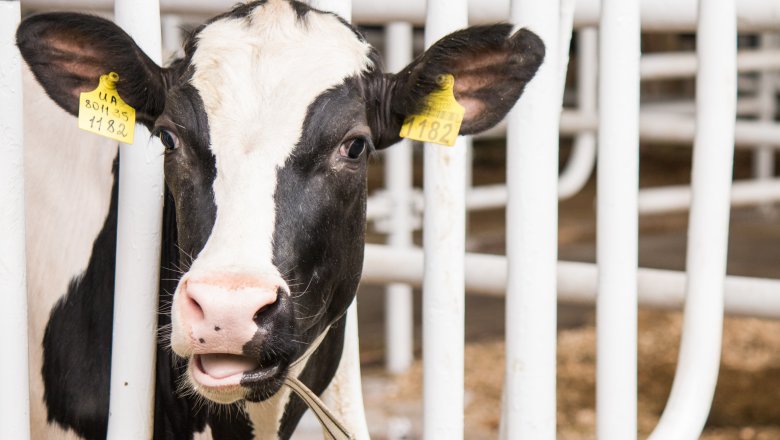Is Your Meat Safe?
It's no secret we're becoming more aware of what goes into our food and, in turn, what we're putting into our bodies. Going organic and pesticide-free is all the rage when it comes to fruits and vegetables, but what about meat? You've probably heard all kinds of stories about things like antibiotics and hormones used in the meat industry, and according to Reuters, restaurants like McDonald's are under increasing pressure to use only beef and pork raised without those things. Let's talk about what you really need to know about the issues, and whether or not you should be worried.
Why are antibiotics controversial?
We've all felt down in the dumps, gone to the doctor, and been prescribed a round of antibiotics to get us up and about again. So why are they bad when they're given to livestock?
According to PBS Frontline, the problem isn't giving animals antibiotics to keep them healthy — it's giving them antibiotics to help them gain weight that's questionable. It's not known why it works, but dosing livestock animals with what's called "sub-therapeutic" amounts of antibiotics increases their weight by as much as three percent. That doesn't sound like much, but ranchers rely on every pound of meat they produce.
The industry has been doing this for decades, but it's only with our relatively recent understanding of how antibiotic resistance works that we're starting to get seriously uncomfortable with the idea. The worry is that regularly ingesting meat containing the remnants of antibiotics will make us more resistant to antibiotics, meaning they won't work as well when we need to take them to fight off illness. That all sounds terrifying, but what does science have to say?
Is there evidence this is happening?
The short answer to that question is, "some." There hasn't been an overwhelming amount of research done into just how much antibiotic use in the meat industry is going to impact, say, that prescription you get from the dentist after having a tooth pulled.
In March 2017, the Animal Health Institute reported on a study done in part by the Medical University of South Carolina. They were specifically looking at salmonella, and they did find evidence suggesting antibiotic resistance in livestock was changing. They also repeated the fact that there wasn't much information out there on what kind of an impact that's ultimately going to have on humans. They did, however, confirm there's enough evidence that we should be concerned — and doing more research.
The US Food and Drug Administration (via ConsumersUnion) has been saying that since at least 2010, when they confirmed using antibiotics for anything other than the intended purpose — health reasons — in livestock did, indeed, make them more vulnerable to superbugs. What that means for us is officially unclear.
Shouldn't the FDA be on this?
They should, and they are. In 2013, the FDA announced they were working with veterinarians to restrict antibiotic use in meat production to health-related reasons only, and to make the most commonly used antibiotics only available through a vet. The project had been in the works since 2010, and it was a huge partnership with farmers, government agencies, vets, the feed industry, consumer groups, and the pharmaceutical companies that make the antibiotics. The program was a voluntary one, because the FDA had determined that was going to get the best response from everyone involved.
The USDA is involved, too, and according to the Meat Institute, there are procedures in place to help make sure a minimal amount is making it into the meat you pick up at the grocery store. Any time an animal is given antibiotics, there's a mandatory waiting period before they're slaughtered and processed. It's overseen by a series of monitoring programs, and any time federal agencies find a high amount of residue or drugs, they investigate.
How does the FDA feel about hormones?
The other thing you hear about all the time is the use of growth hormones, so let's talk about the official line on that. According to the FDA, hormones approved for use in livestock include things like testosterone, estrogen, and synthetic versions of those. They've been doing it since the 1950s, and all of those chemicals have been approved only after extensive testing to prove the won't have any effects on the people who are ultimately eating meat and other animal products, like milk and cheese.
Hormones are delivered via a dissolvable implant in the animal's ear, and while the ear itself doesn't make it into anything that ends up on your plate, it's also worth noting that the FDA deems this process so safe, there's no waiting period between treatment and dinner.
But what does science say about hormones?
Part of the debate suggests the problem comes when humans ingest hormones from an outside source. The American Public Health Association says as early as 1971, we've known high doses of estrogen can act as a carcinogen. The hormone examined in that original study isn't used anymore, but there are still questions on whether or not eating meat — or dairy products — from animals treated with these hormones is making us more susceptible to various types of cancer. In 2015, researchers from Urmia University compiled data collected by previous studies and found there seemed to be a cause for concern.
But, there's another side to the argument. A 2010 study looked at the risks associated with a series of hormones, including one called zeranol. Zeranol seemed to raise instances of tumors in lab animals, but according to the US Anti-Doping Agency, you're not going to be getting it in US-raised meat. It's approved for use in livestock, but the USDA and the USADA both regularly test for it. The USADA logged more than 100,000 tests over 15 years, with only a single sample testing positive for the hormone. That's worth remembering.
What should I know about Zilmax?
Every so often, a story hits headlines that brings this entire issue into sharp, horrible focus. That happened in 2013, when Reuters reported a small group of cattle raised with the help of a muscle-building drug called Zilmax were euthanized. They arrived at the slaughterhouse crippled from missing hooves.
Even the most dedicated meat-eaters can all agree that's horrible. Slate says Zilmax actually started as a human medication, created to treat asthma. It was later found to turn fat into muscle in beef cattle, and even though it also decreased the quality of the meat, nationwide meat packers started accepting animals treated with the drug. That changed in 2013, with headlines and the suspension of all sales and use of Zilmax by parent company, Merck. According to PennState Extension, Zilmax was just one of a group of beta-agonists given to beef cattle to help raise their weight and, ultimately, the profits ranchers make off them.
Is US and Canadian meat banned in the EU?
Sites like The Daily Meal (via the Huffington Post) are quick to point out all the foods — including beef, farmed salmon, and arsenic-filled chicken — that are on shelves in the US but on the banned list in the EU, but it's more complicated than that.
Let's look at the Irish Independent's reporting on a 2017 trade agreement between the EU and Canada. A major change came after a 21-year dispute over what hormones were used and whether or not they were safe for human consumption. Now, a more accurate way of phrasing the dispute is that importing US and Canadian meat is extremely limited, not banned entirely. In recent years, the amount of meat deemed safe and imported into EU countries from the US has been on the rise (via Mylo Trade). Activists in the EU have noticed, too, with articles in publications like the EUObserver running pieces that condemn the move to open EU borders to more US meat.
The American Public Health Association says the debate is over the use of steroid hormones and bovine growth hormones, both of which are illegal in the EU.
A burger, with a side of pesticide?
We're all familiar with the debate that rages around organic foods and pesticide use, but it's possible you didn't hear about the same concerns over your meat. Like the rest of this issue, it's complicated. Medium talked to Dr. Nathan Donley of the Center for Biological Diversity, and he says pesticide-contaminated meat happens when livestock are fed crops grown with pesticides. He adds since pesticides — even including long-banned compounds like DDT — can build up in an animal's tissue, there's a chance some may sneak onto your plate. In 2010, The Grist picked up a story that supported that, and they quoted the USDA as not only confirming pesticides and heavy metals were making it into our food supply, but that they might be made even more dangerous by cooking them.
But! Fast forward to 2017, when the FDA released the results of pesticide testing from 2015 (via Food Safety News). They found 98 percent of foods tested (including grains, fruits and veg, fish, dairy, and meat) fell well below the "safe" threshold for pesticides. Only a single sample of game meat — from an elk — contained an unacceptable level of DDT.
What's riskiest in terms of illness?
When we talk meat safety, you undoubtedly know all about cross-contamination and salmonella risks of raw chicken, so let's talk about more obscure dangers.
Sarah Klein of the Centers for Science in the Public Interest (via Prevention) headed up a study compiling data from the CDC to figure out which meats are the most dangerous. They found chicken was linked to the highest number of illnesses, but they say you also need to account for the fact we eat way more chicken than beef, too — and that can contribute to skewed numbers.
Also high on the danger list is ground meat, because of the high chances of contaminated meat making it into the mix. Klein says turkey has some of the same dangers as chicken, and there might be something lurking in your steak, too. Since antibiotics and hormones contribute to bigger animals but tougher meat, many cuts are now tenderized before they're packaged. That means the surface bacteria you think you're searing off on the outside has been driven into the center of the meat, and leaving that pink is going to leave the bacteria, too. That's some serious food for thought.
What do I need to know about processed meat and cancer?
Social media went a bit mad a while back, when the World Health Organization slapped processed meats with a "carcinogen" label. That's scary, but Science Alert says it's not as bad as you think.
First, some clarification. We're talking about any meat that's been fermented, smoked, cured, or salted, so that's stuff like bacon, ham, hot dogs, and jerky. Since some scaremongering headlines claimed processed meat was just as bad as smoking, let's go there. Cancer Research UK says if we got rid of smoking, we would have 64,500 fewer cases of cancer diagnosed every year. Extend that logic, and getting rid of processed meats would mean 8,800 fewer cancer cases. That's still a lot, but you see the difference here.
It's also worth noting we're not talking about all types of cancer. Cancer Research UK says processed meats have been linked to a higher risk of bowel cancer, and they also stress that everyone and their risks are different, so there's no single smoking gun.
How much meat is recommended?
After research on the potentially carcinogenic effects of processed and red meats, science started trying to figure out what was good for us. Red meat does contain all kinds of good stuff, like protein, vitamins, and minerals — especially iron, which we all need. BBC Good Food generally says we should aim for less than 70g of red or processed meat in a day, and less than 500g per week. (For some idea of just how much that is, a slice of ham is 25g, and a 5-ounce steak is 80g.)
For the sake of science, BBC Horizon's Dr. Michael Mosley doubled his red meat intake to 130g a day to see what would happen. He says that after a month, he'd not only gained weight, but his cholesterol was off the charts and so was his blood pressure. It was a hard lesson on the importance of meat in moderation, and it's a clear example of how cutting back on the red meats can make a serious difference in your family's overall health.











